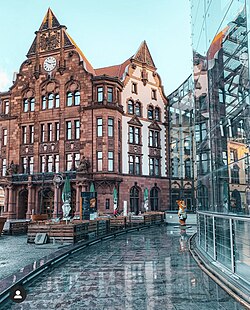
Summary
Altes Stadthaus in Dortmund, North Rhine-Westphalia, Germany, is an office block which was built in 1899, and was designed by "master builder"[1] Friedrich Kullrich (a German architect, urban planner and construction officer from Berlin).[2] It was built in the Renaissance Revival architecture (Neo-Renaissance) style. After the office block was severely damaged in World War II, it was rebuilt in a simplified form.
| Altes Stadthaus | |
|---|---|
 | |
 | |
| General information | |
| Town or city | Dortmund, North Rhine-Westphalia |
| Country | Germany |
| Completed | 1899 |
| Design and construction | |
| Architect(s) | Friedrich Kullrich |
At the top of the gable is an eagle emblem, representing the city of Dortmund. The façades are made of Old or New Red Sandstone and the lateral parts have plastered surfaces. Kullrich said that the Stadthaus was in the shape of Altes Rathaus. The Stadthaus is a short distance from Alter Markt, which houses the Rathaus on the south. The Rathaus was restored shortly after the Stadthaus was built, under the direction of the Commissioner of City Planning, for the City of Imperial visit to Dortmund in 1899. A new hall was built in 2002 (the Berswordt Hall), at Peace Square in Dortmund. Directly opposite of Peace Square is the Rathaus (town hall). The Berswordt Hall includes citizen services, a café and a shop, and was named after the Berswordt, one of the oldest families in Dortmund, who were first mentioned in 1249.[3] The Stadthaus is mainly used by the Dortmund city administration, and has been since it was built. The office block is listed on the Denkmalliste der Stadt Dortmund (Monument list of Dortmund), which contains 1,015 monuments, many of them being listed buildings.[4][5]
References edit
- ^ Achim Bourmer (2010). Ruhrgebiet. Baedeker. pp. 149–. ISBN 978-3-8297-1182-1.
- ^ Adelheid von Saldern (2006). Stadt Und Kommunikation in Bundesrepublikanischen Umbruchszeiten. Franz Steiner Verlag. pp. 235–. ISBN 978-3-515-08918-0.
- ^ "Berswordthalle & Altes Stadthaus". Dortmund Tourism. Retrieved 2012-10-06.
- ^ Denkmalbehörde der Stadt Dortmund, ed. (2008-10-27). "Denkmalliste des Stadtbezirks Innenstadt-West" (PDF). dortmund.de – Das Dortmunder Stadtportal. Retrieved 2012-10-06.[permanent dead link]
- ^ Denkmalbehörde der Stadt Dortmund (ed.). "Oktober 2008 – Das Dortmunder Stadthaus im Wandel der Zeit: Der zweite Bauabschnitt ist abgeschlossen". dortmund.de – Das Dortmunder Stadtportal. Retrieved 2012-10-06.[permanent dead link]
51°30′40″N 7°28′2″E / 51.51111°N 7.46722°E


